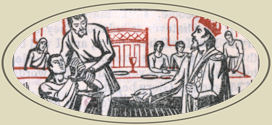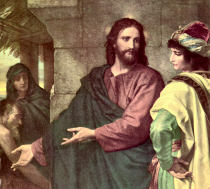» Enjoy our Liturgical Seasons series of e-books!
The king said to him, "My friend, how is it that you came in here without a wedding garment?" But he was reduced to silence. Then the king said to his attendants, "Bind his hands and feet, and cast him into the darkness outside, where there will be wailing and grinding of teeth." Many are invited, but few are chosen (Mt 22:12-14).
The feast of St. Theresa of Avila, which is ordinarily celebrated today, is superseded by the Sunday liturgy.
Click here for commentary on the readings in the Extraordinary Form of the Roman Rite.
Sunday Readings
The first reading is taken from the Book of the Prophet Isaiah 25:6-10a. In today's reading Isaiah describes under the image of a great banquet, the blessings, the contentment and happiness that the messianic kingdom will bring.
The second reading is from the Letter of St. Paul to the Philippians 4:12-14, 19-20. The Philippians were the only converts from whom St. Paul accepted any financial help. He is thanking them here for some such assistance which he must surely have needed for he was in prison when he wrote this letter. He assures them that God will reward them for the charitable aid given him.
The Gospel is Matthew 22:1-14. How foolish the Pharisees were in not listening to our Lord's warnings. He gave them every opportunity to turn away from the false path which their pride had chosen for them. His divine heart was ever ready to embrace them if only they would say "mea culpa." "Jerusalem, Jerusalem, you who kill the prophets, and stone them that are sent to you, how often would I have gathered together your children, as the hen does her chickens under her wings, and you would not" (Mt. 23:37)? "God created us without our cooperation," says St. Augustine. "but he cannot save us unless we cooperate."
We too could make the Pharisees' mistake. We have the invitation to the wedding feast; in fact, we are already in the banquet hall, since our baptism; but are we wearing the wedding garment of virtue and grace? If not, we are no better off than those who rejected the invitation. The king may come in at any moment and cast out those who are not properly dressed. Being a member of the Church on earth is a wonderful privilege, and a sure guarantee that we will reach heaven, if we do what is expected of us. But the same obstacles which prevented the Pharisees from entering the kingdom—love of this world, its wealth and its pleasures—can impede us too, unless we are on our guard. The world with its allurements is very close to us; heaven seems very far away. Thus we must be prepared to do violence to our ordinary inclinations, to go against them whenever and wherever "the things that are Caesar's" tend to blot out or make us forget "the things that are God's."
This implies a daily carrying of the cross, a daily struggle against our evil inclinations, a daily endeavor to acquire true love of God and neighbor. This may sound superhuman, but Christ did not ask anyone to do the impossible. He led the way, and millions have followed him to eternal glory. He has called us too and has placed within our easy reach in his Church all the grace we need. If we fail to use these divine helps, if we are found without the wedding garment, we will have no one to blame but ourselves. We have been called with the many. We can be among the "chosen."
Excerpted from The Sunday Readings by Fr. Kevin O'Sullivan, O.F.M.
 Commentary on the Readings for the Nineteenth Sunday after Pentecost
Commentary on the Readings for the Nineteenth Sunday after Pentecost
"'Go therefore to the crossroads, and invite whomever you shall find.'" (Gospel).
We approach the end of the Church's year. We, too, have grown to maturity. In our youth we regarded perfection an easy accomplishment. Now we plead for Redemption. We implore His Mercy to direct our hearts (Prayer) in the evening of our life (Offertory).
Our plea today is: Give peace, O Lord. What is the condition for peace with neighbor, peace amongst nations? It is a call to set ourselves right with God!
Are we ambassadors of peace to others? The paralytic was unable to do anything for himself. Did not Jesus cure him, absolve him, only when his friends brought him and He saw their faith?
Excerpted from My Sunday Missal, Confraternity of the Precious Blood






